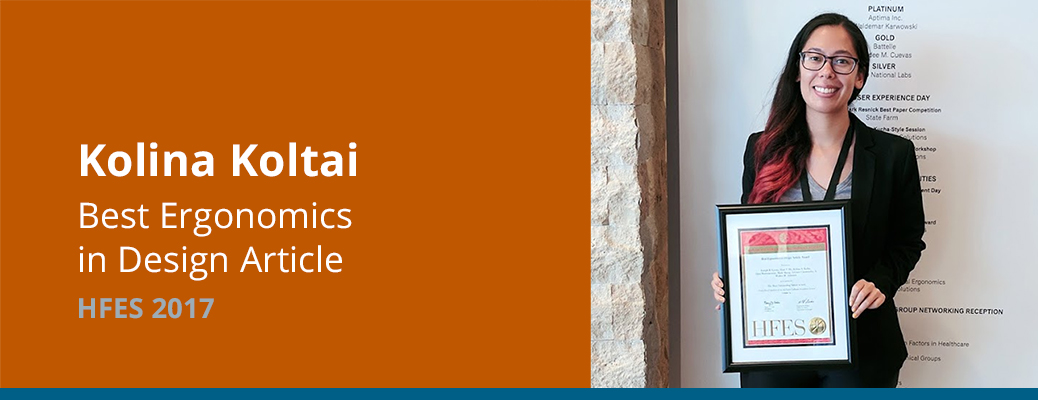Texas iSchool doctoral student Kolina “Koko” Koltai is being honored for research into technology that helps save the lives of military pilots.
Koltai and six co-authors received the 2016 Best Ergonomics in Design Article Award from the nonprofit Human Factors and Ergonomics Society for their paper, “Trust-Based Analysis of an Air Force Collision Avoidance System.”
The case study analyzed the factors that influence trust and acceptance among test pilots using the Air Force’s Automatic Ground Collision Avoidance System (Auto-GCAS).
Human error is a leading cause of airplane crashes that result in loss of life. To protect its pilots, the Air Force developed the technology to assume control of aircraft that is 1.5 seconds from the point of no return from a collision with a mountain, body of water or other terrain. Once the collision has been averted, the system returns controls to the pilot.
“A system like Auto-GCAS that takes control away from the pilot is something that is not typically accepted within the pilot community,” said Koltai, who worked on the project when she was a master’s student of experimental psychology at California State University, Northridge. “They are typically very distrustful of not only new technologies but ones that ‘impede’ on their control of the aircraft.”
In 2014, the Air Force introduced automated system to its F-16 Fighting Falcon fleet. Deployment of Auto-GCAS has already saved lives, including a student pilot who lost consciousness from his aircraft's rapid acceleration in September 2016.
While the Air Force was still developing the automated system, Koltai and her co-authors studied how test pilots, engineers and managers developed trust with it. Through years of surveys, interviews, field visits and a grounded-theory approach, they found that test pilots’ trust depended on a number of factors, including:
- the development of a nuisance-free algorithm
- designing fly-up evasive maneuvers consistent with a pilot’s preferred behavior
- using training to assess, demonstrate and verify the system’s reliability
The study was part of a larger, multiyear project investigating how cultural, organizational, and automation capability factors influence how different groups develop trust with automated systems. For pilot acceptance of Auto-GCAS, the factors are consistent with previous literature on trust in automation and could lead to best practices for automation design, testing and acceptance, Koltai said.
As Koltai’s doctoral adviser, Texas iSchool Associate Professor Ken Fleischmann, explains, the Human Factors and Ergonomics Society has been a leading professional organization for human factors researchers and professionals for the past 60 years. “It is an unusual and remarkable honor for any scholar to receive a best paper award from a major journal, let alone as a doctoral student starting her third year in the doctoral program,” he said, “so I am very proud that Koko’s research has been recognized with this significant honor, and that she was able to accept the award and present her research at the HFES International Annual Meeting here in Austin.”

